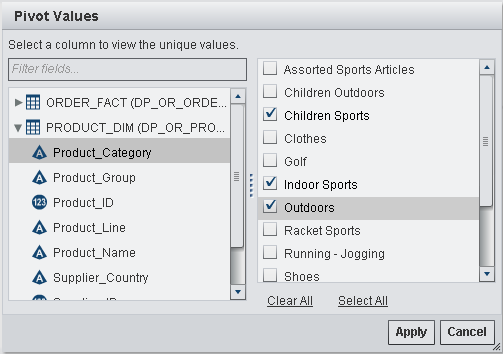Using the Pivot By Feature
The pivot by feature
provides an easy and powerful way to summarize data for analytics.
You can specify a column to use as a categorical variable and the
unique values to use. When the query is run, the output table is summarized
with the aggregations that you apply.
To use the pivot by
feature:
The following display
shows an example of the Column Editor tab
when a pivot by column is used. The minimum and maximum Total_Retail_Price
are calculated for each Customer_ID and are then pivoted by (transposed
by) three values of the Product_Category column.
Column Editor Tab with a Pivot By Column

Tip
TRP is specified as a label
for the Total_Retail_Price column. Look at the next display to see
how the label is used to create labels for the new columns.
The following display
shows how pivoting the Customer_ID column by three values of the Product_Category
column results in additional output columns. A substring of the pivot
by values is used as a prefix to each column name and the aggregate
function is used as a suffix. The pivot by column label and aggregate
function are used in the output column label.
Output Columns Tab with Pivot By Values

Copyright © SAS Institute Inc. All rights reserved.
